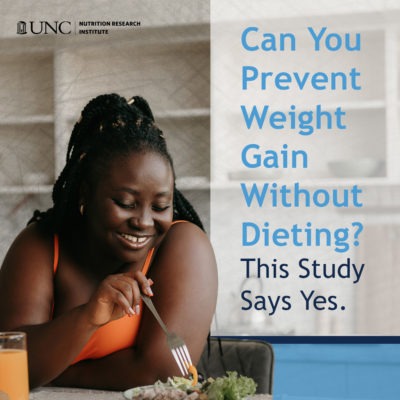For many adults, eating in response to emotions rather than hunger – known as emotional eating – can lead to unwanted weight gain and increase the risk of serious health conditions like heart disease and diabetes. A new pilot study led by UNC Nutrition Research Institute faculty Rachel Goode, PhD, MPH, LCSW, tested a new strategy to help adults who emotionally eat maintain their weight, and the results offer promising early evidence.
The study tested the SATISFY program, a 12-week, online group intervention that combined Appetite Awareness Training (AAT) – a method that helps individuals learn to recognize true hunger and fullness cues – with content from the proven Diabetes Prevention Program. Participants, all adults with higher body mass indexes (BMI ≥ 25), engaged in weekly virtual sessions and received feedback via a digital platform that tracked weight and eating behaviors. The goal was not rapid weight loss, but weight maintenance – a health goal that is often overlooked but may be more realistic and sustainable for many people.
“”The purpose of this study was to see if by equipping participants with the fundamentals of listening to their signals of hunger and fullness, we may be able to position them to have long-term skills to maintain their weight beyond the weight loss period. Long-term maintenance of weight loss can be very challenging. It is encouraging that we are taking a step to see what may be a tool to help people” says Goode.
One of the major outcomes of the study was that participants largely maintained their weight over the course of the program and at the two-month follow-up. This matters because, even without weight loss, halting weight gain can significantly reduce the risk of high blood pressure and other health complications. In fact, prior studies have shown that maintaining weight over time can slow or prevent the progression of chronic diseases.
💡Core Terminology
- Emotional Eating: eating in response to emotions rather than hunger
- Appetite Awareness Training: a method that helps individuals learn to recognize true hunger and fullness cues
- Interoceptive Awareness: the ability to sense internal body signals like hunger and fullness
- Disinhibition: the tendency to overeat in response to external cues or emotions
Beyond weight, participants also reported a boost in interoceptive awareness – the ability to sense internal body signals like hunger and fullness. This skill is often reduced in individuals who emotionally eat and improving it can help people make more conscious and regulated decisions about eating. Participants also showed lower levels of disinhibition, or the tendency to overeat in response to external cues or emotions, which is closely linked to emotional eating.
Importantly, participants found the program to be moderately to highly acceptable, with 77% completing the full six-month follow-up. Attendance was about 50%, a strong showing for a virtual group-based program, especially one focused on behavior change. These figures suggest that a remote, structured approach like SATISFY could be a feasible solution for many adults – especially those in underserved communities where access to in-person care can be limited.
In a healthcare landscape that has long prioritized weight loss, this study reflects a shift in thinking: helping people maintain their current weight and build sustainable habits may be just as valuable, especially for those vulnerable to emotional eating. While this was a small pilot study, the findings support further research and refinement of SATISFY and similar programs to offer meaningful, accessible tools in the fight against preventable chronic disease.
Rachel Goode, PhD, MPH, LCSW, is an Associate Professor of Social Work and Psychiatry at the UNC Nutrition Research Institute. Her research interests include developing, implementing and evaluating equitable and community-engaged interventions to treat obesity and eating disorders.
Most publications are a group effort, and this one is no different. Many members of the Goode Lab at the NRI are cited in this publication as well as our interim director, Deborah F. Tate, PhD.
Goode Lab Members
- Ramine C. Alexander, PhD
- Ana Paola Campos, PhD
- Tyisha Harper-Cooks
- Julian Robles
Goode, R. W., Blackman Carr, L. T., Xu, Y., Harper-Cooks, T., Wilhoit-Reeves, S., Alexander, R. C., Campos, A. P., Robles, J., & Tate, D. F. (2025). Preventing weight gain in adults who emotionally eat: An open pilot. Eating Behaviors, 57, 101960. https://doi.org/10.1016/j.eatbeh.2025.101960

